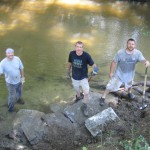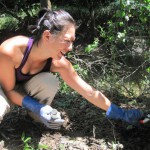- Build it and they will come: Todd Howell, Greg LaRue, and property owner T.J. Hooper begin the work of setting the stone steps that lead from the river to a new paddle-trail campsite in Transylvania County, the second to be built on the developing trail along 117 miles of the French Broad River. Photos courtesy of Hartwell Carson/WNCA
- Stairway to heaven: Paddlers looking for a night’s rest will find a haven at the second campsite to be built along the 117-mile paddle trail on the French Broad River. Such stops are presently few and far between, since most of the river bank is privately owned.
- No rest for the weary: Volunteers Kate Isenberg and Kendra Martinez react as their crew leader jokes, “OK, back to work!” More than 20 participants lent a hand to construct the second paddle-trail campsite along the French Broad River, this one in Transylvania County. photo courtesy of
- Trail outreach: Ching Fu, Outreach Specialist at REI, prunes woody vegetation as the new campsite takes shape along the developing French Broad Paddle Trail. REI provided a grant to develop the second of the campsites along a paddle trail that is planned to cover the entire 117-mile river course through WNC.
Two local nonprofits, one shared vision: a series of campsites enabling paddlers to explore the 117 miles of French Broad River in Western North Carolina without having to retreat to civilization each night. RiverLink and the WNC Alliance are pursuing separate but complementary approaches to realizing the dream of a “paddle trail” from Rosman, N.C., to the Tennessee line.
Currently, multiday paddle trips are difficult, because the river mostly flows through private land. The challenge is finding landowners willing to provide a small area where boaters can camp overnight.
French Broad Riverkeeper Hartwell Carson, a staffer at the Alliance, recently secured a $5,000 grant from REI to fund the first two of seven planned campsites. Each year, the outfitter dedicates 3 percent of its profits to its Community Grants program: local employees nominate projects to fund. The Alliance grant was one of four awarded to Asheville-area nonprofits in 2011, REI Outreach Specialist Ching Fu reports. Since 2008, the company’s Asheville branch has donated a total of $77,000 to 13 local nonprofits, she notes, focusing on groups that emphasize environmental conservation and volunteerism.
Meanwhile, Carson had found a willing host in the Hooper family, whose farm adjoins the French Broad in Transylvania County’s Little River community. T.J. Hooper says he’s enjoyed kayaking the river for years, and he hopes his move will inspire other landowners, “so I can do the same thing farther down the river that we’re allowing people to do on our property.”
Armed with that support, Alliance volunteers and staff joined forces with REI staffers one recent Saturday to create the second campsite. (AmeriCorps volunteers built the first one, in Etowah, in May.) With a little help from a backhoe, workers installed rock steps to access the river, cleared brush, replaced invasive species with native plants, and added a picnic table and fire ring.
“By the end of the day, we had this nice, pretty set of stairs, and the site was all cleared out,” says Carson, calling the experience “immediate gratification.” Users, he explains, will pay a modest fee: Most of it will go to the landowners, with a small portion retained to cover maintenance.
Paddle in, paddle out
RiverLink, meanwhile, is charting its own course toward this common goal. In 2009, the nonprofit received a grant from the Pigeon River Fund to assess public support and scope out the logistics of creating a paddle trail, Watershed Resources Manager Nancy Hodges explains. An advisory council of local paddlers, planners and educators considered what it would take to build and maintain the trail; studied potential campsite locations and signage; and researched successful paddle trails, such as the one on the Roanoke River in eastern North Carolina. Design guidelines for the leave-no-trace campsites are expected to be completed within the next month or so.
RiverLink envisions a strictly paddle-in, paddle-out trail, says Hodges: “We’re trying not to have a lot of road access, which presents additional maintenance issues.” The nonprofit, she notes, has received funding commitments (pending state budget approval) through the N.C. Division of Parks and Recreation’s State Trails Program to develop sites in Buncombe and Madison counties; river access and campsite opportunities are also emerging in Transylvania and Henderson counties.
Eventually, says Hodges, RiverLink hopes to have a campsite every six to eight miles, with interpretive signs explaining the river’s geologic history. A major challenge is the three dams paddlers would need to portage, she explains.
And since RiverLink wants to keep access to the trail free, the nonprofit is organizing the Friends of French Broad River, whose volunteers would maintain the campsites and manage a website providing information and a reservations system. A map of the completed trail is also planned, says Hodges, adding that the route will continue from the Tennessee line to Knoxville, where the French Broad joins the Holston to create the Tennessee River. There’s also strong interest in eventually establishing campsites on the Tennessee side, she explains.
Carson agrees, saying, “We thought it would be cool if we could turn an underutilized recreational resource into a world-class-destination paddle trail.”
And if it takes awhile to iron out all the details, paddlers can take a cue from the ancient river itself, which has survived at least three geologic upheavals since the Earth first formed, notes Hodges.
In the meantime, Asheville Outdoor Center owner Dave Donnell says he’s thrilled at the prospect of overnight trips connecting the headwaters with his riverside business in Asheville. “This will be another great way to enjoy the scenic French Broad River,” he observes.
— Send your local environmental news and tips to sandrew@mountainx.com, or call 251-1333, ext. 153.










Before you comment
The comments section is here to provide a platform for civil dialogue on the issues we face together as a local community. Xpress is committed to offering this platform for all voices, but when the tone of the discussion gets nasty or strays off topic, we believe many people choose not to participate. Xpress editors are determined to moderate comments to ensure a constructive interchange is maintained. All comments judged not to be in keeping with the spirit of civil discourse will be removed and repeat violators will be banned. See here for our terms of service. Thank you for being part of this effort to promote respectful discussion.